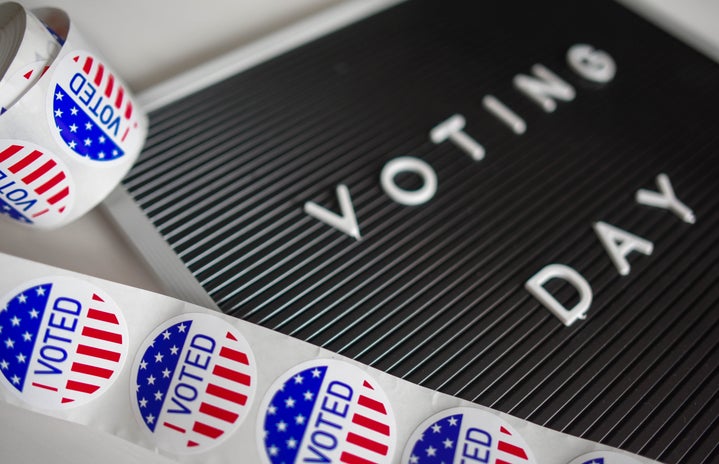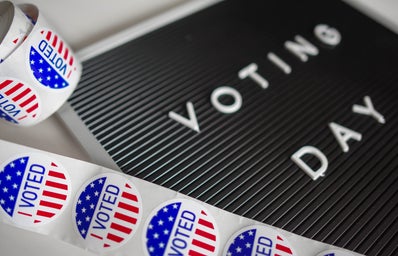This year has been like no other, and we have seen change, division, unification, and witnessed the birth of new lives and lost some along the way. In addition to all of these events, we are coming up on another historical election on November 3. The results of these elections can affect how the next year, four years, six years, and even beyond will go. In past elections, we have seen statistics of those who did not vote. Whether you were not old enough to vote in past elections, did vote, or did not vote, this upcoming election is a chance for your voice to be heard. As the countdown to election day approaches, here are 10 things you need to do before Tuesday, November 3rd.
- Check Your Voter Registration Status
-
The last thing any of us need is to stand in line only for our registration to be expired or non-existent. It is easy to check your status, even if you are sure that are registered. Some issues, especially in GA, have caused many voter statuses to change to inactive. If you check your status early, before voting, you can save yourself time and frustration when election day comes. To check your status, first, go to the “Can I Vote” page of the National Association of Secretaries of State. Click voter registration status and choose your state. Once you choose your state, it will take you to the “My Voter Page” based on your state. From this site, you can type in your First Initial, Last name, County, and Date of Birth. Click submit, and you should see a page with your voter information. Under your race, you should see Status. Make sure that says active! If it says active, you are good to go to the next step! If you are not yet, registered, you can do that easily too! Go to Vote.gov to find out the registration deadline for your state and how to register!
- Figure Out Your Voting Location
-
On the same page as the voter information, you should see the voting location. This location is assigned based on your address and the county or parish in which you are registered. As voting locations open and close, it is imperative to look at what location is showing up on your page. This location may be different from the location where you voted in the previous election. Knowing where you are going beforehand can also mentally prepare you for any travel you may have to account for on Election Day. You can add this location in your phone’s GPS, so when November 3 rolls around, you already know where you need to be heading. Don’t forget your mask and some water; prepare for long lines!
- Request Your Absentee Mail-In Ballot
-
If you are on campus, don’t want to risk your health due to COVID-19, or can’t vote for another reason, be sure to request your absentee ballot right away. Do it today! Do it right now! If you are already on your MVP, you should be able to request an absentee ballot easily on the same webpage. Check to see your state’s policies on absentee voting. According to Vote.org, states will either be Excuse (Voters need an excuse to request absentee ballots), No excuse (Voters don’t need an excuse), or Mail-In Only (Voters request absentee ballots only if they need their ballot mailed to a different address). From Vote.org’s Absentee Voting Rules Page, you can select your state and see what the rules are. In Georgia, any voter may request an absentee ballot and vote absentee. If you want to mail, fax, or email your ballot rather than go to the polls, request a ballot now! Although you have until Election Day, request the ballot early, and return it as soon as possible. Anything can occur before Election Day, and we want to make sure your vote gets counted.
- Research Presidential and VP Candidates Beforehand
-
By now, everyone knows who the main two candidates are for the 2020 Presidential Elections. During the 2020 Republican National Convention, the GOP officially nominated President Donald Trump as the Republican Party Presidential Candidate and Mike Pence as the Republican Party Vice Presidential Candidate. The Democratic Party officially nominated former Vice President Joe Biden as the Democrat Presidential Candidate and Senator Kamela Harris as the Democratic Vice Presidential Candidate during the 2020 Democratic National Convention. There are many ways to learn about each candidate, especially as we get closer to November. When researching each candidate and their running mates, try and find credible news sources with little bias to learn about previous policies and political background. Each candidate also has their own webpage that will outline their policies and campaign promises. It may be the easy route to just go based on your own party and vote for whoever the party nominates; before making a blind decision, actually learn about who you are casting your vote for and who you want to be representing you in Washington, DC.
- Identify which Offices are Open in Your District and State
-
If this is your first time voting or you are unfamiliar with the process, this election will not just be about voting for the President and Vice President. Positions for local, state, and federal positions will be open based on where you live. Your state may have open seats in the Senate that require votes to fill those seats. Around your city, you may notice political signs on street corners and in front of houses of people running for various offices. You don’t have to vote just for which name you see the most around your city or which candidate spent the most on their campaign. Identify who is running, what position they are running for, and their political stance. Even if you choose a Republican or Democratic ticket, there will be multiple people running for various positions requiring you to choose. Aside from knowing each candidate, make sure you know what the position entails. What does a US Senator do? What does a Secretary of State do? What is a Lieutenant Governor? Looking at a sample ballot before Election Day will give you the names of each candidate and also some information on questions they may ask you on November 3. These questions can be about laws they want to get feedback on before proposing them or voting in local or state legislature. Being familiar with the names, positions, and other questions before Election Day will allow you to make educated decisions at the ballots.
- Learn about What Issues Hang in the Balance
-
If you haven’t heard, Associate Justice Ruth Bader Ginsberg passed away on September 20, 2020. In case you are unfamiliar with the Supreme Court, a term is unlike a political office. US Senators have six-year terms, US Representatives have two-year terms, while US Presidents have four-year terms. Once a US Supreme Court Justice is nominated by a President and confirmed by the senate, they have life terms. They have no elections and only end terms if they retire, get fired, or pass away. A President can nominate someone who follows their policies and shares the same ideals. This Supreme Court nominee will be the legacy of the President after a new President is elected. If the Senate is the same party as the President, which is the case now, there is a rush to fill the seat before Election Day comes for fear of a party switch and a new President filling the seat. There are issues that are going to be decided based on the outcome of these elections and Supreme Court nominees, such as environmental protection, reproductive rights, gender equality, and LGBTQ+ rights. Laws, precedents, and executive orders can affect the way these issues are addressed, and the future of those who depend on these protections. Learning about a candidate’s party is not enough; you need to research their stances on various issues to see if you and the candidates are on the same page and if they are going to fight for what you stand for.
- Encourage Your Friends and Family to Vote
-
Our democracy only works when people do their part, which includes voting. If people choose not to vote, the results of any election are inflated and will not be representative of the population’s views. Maybe you have heard your family or friends say they don’t want to vote this election because it “won’t matter,” or they voted in the past and it didn’t turn out as they wanted. Maybe they have lost faith in the presidential election, or they dislike both candidates. Remind them that this election is not just about the presidential candidacy, nor is it already decided. Votes, whether they are direct votes or to the electoral college, will be counted to declare winners. Even if one doesn’t care about the president, remind them that there are other vacancies, even ones who will directly affect your city, county, or state. Voting is not going to take anything away from them and can be done in the comfort of their own home. Reminding family and friends about voting this November can help them either remember to vote or give you their reasons why they don’t want to vote so you can try and change their minds. If you are under 18 and will not be eligible to vote in this upcoming election, reminding your family and friends will ensure votes will still be counted even if you can’t vote.
- Spread the Word on Social Media
-
In this digital age, it is hard to not be on social media. This network connects us with people no matter the distance between us. Our followers and friends on social networks represent those we can influence through what we share and post. Everyone can choose who they follow and what they like, but why not share posts about voting. If you don’t want to endorse a certain candidate, you don’t have to share posts about a certain person. Sharing posts about voting information for your state can help spread the world and someone may see it who didn’t know that they could request an absentee ballot, for example. You don’t have to even do much work creating posts, because social networks such as Instagram make it easy to repost to your story in just a few clicks. If someone does not like hearing about voting, they can unfollow, because it is your page and you can post what you want. If you feel strongly about voting and want other people to care about our democracy as well, share that post!
- Get Any Necessary Documents Together
-
Before going to vote, make sure you have any necessary documents beforehand. On Vote.org, scroll down and find your state to get information specific to voting in your state. Once you find your state’s page, scroll down again to see In-Person and Absentee Voter ID requirements. Mainly the requirement is a valid US Government Issued ID or a Government ID issued by your specific state. Just to be sure, check the requirements and any expiration dates that might occur before November 3. Take the necessary precautions now, which could mean renewing your license before it expires, so you do not have to deal with issues at the polls.
- VOTE VOTE VOTE
-
The last step is to VOTE! If you can vote early in your state, do so. The turnout in your county may have been low during primaries, but that doesn’t mean lines won’t be forming on November 3. With social distancing and COVID-19 restrictions, the lines may seem even longer. With cleaning after every voter, there is no telling how long you may be waiting. You can try and avoid this by voting early. On your MVP, you can see early voting locations and times the locations are open. This will save you time and the stress of Election Day. If you choose to vote early, still do your research beforehand!
Familiarize yourself with voting registration dates and deadlines through the calendar for your state. If you are registered to vote in Georgia, you can view the calendar for 2020 here. If you are registered in another state and want all the information you need for this voting period check out Vote.org. Create a reminder for November 3, 2020 or when your early voting starts, and get to those polls (or send in your ballot); every voice and vote counts!



